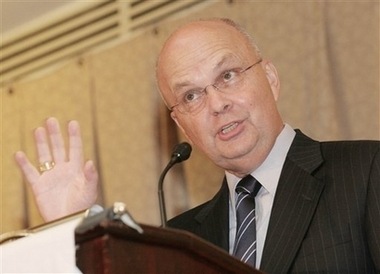Controversial CIA videotapes destroyed
Updated: 2007-12-07 08:49
WASHINGTON -- The CIA videotaped its interrogations of two top terror suspects in 2002 and destroyed the tapes three years later out of fear they would leak to the public and compromise the identities of US questioners, the director of the agency told employees Thursday.
|
|
CIA Director Michael Hayden said House and Senate intelligence committee leaders were informed of the existence of the tapes and the CIA's intention to destroy them. He also said the CIA's internal watchdog watched the tapes in 2003 and verified that the interrogation practices were legal.
He said the CIA began taping the interrogations as an internal check on the program after President Bush authorized the use of harsh questioning methods. The methods included waterboarding, which simulates drowning, government officials said.
"The Agency was determined that it proceed in accord with established legal and policy guidelines. So, on its own, CIA began to videotape interrogations," Hayden said in a written message to CIA employees, obtained by The Associated Press.
The CIA also decided to destroy the tapes in "the absence of any legal or internal reason to keep them," Hayden wrote. He said the tapes were destroyed only after it was determined "they were no longer of intelligence value and not relevant to any internal, legislative or judicial inquiries."
"The tapes posed a serious security risk," Hayden wrote. "Were they ever to leak, they would permit identification of your CIA colleagues who had served in the program, exposing them and their families to retaliation from al-Qaida and its sympathizers."
The CIA only taped the interrogation of the first two terror suspects the agency held, one of whom was Abu Zubaydah. Zubaydah, under harsh questioning, told CIA interrogators about alleged 9/11 accomplice Ramzi Binalshibh, Bush said in 2006.
Binalshibh was captured and interrogated and, with Zubaydah's information, led to the capture in 2003 of Khalid Sheikh Mohammed, the purported mastermind of the 9/11 attacks.
Hayden said a secondary reason for the taped interrogations was to have back-up documentation of the information gathered.
"The Agency soon determined that its documentary reporting was full and exacting, removing any need for tapes. Indeed, videotaping stopped in 2002," Hayden said.
The CIA is known to have waterboarded three prisoners since the Sept. 11 terrorist attacks, but not since 2003. Hayden banned the use of the procedure in 2006, according to knowledgeable officials.
|
|
|
||
|
||
|
|
|
|


